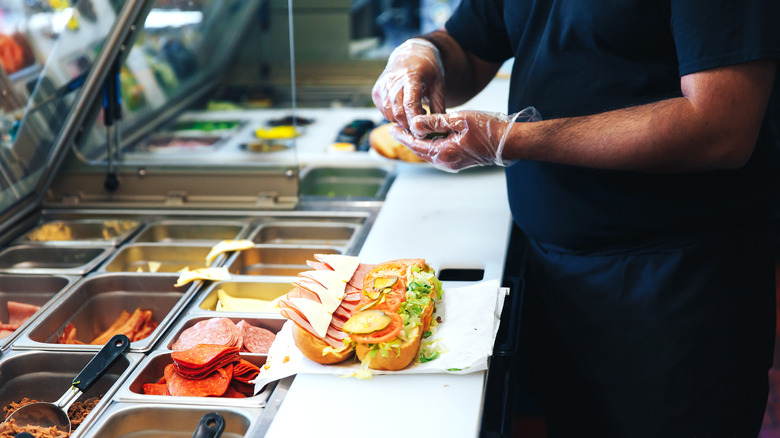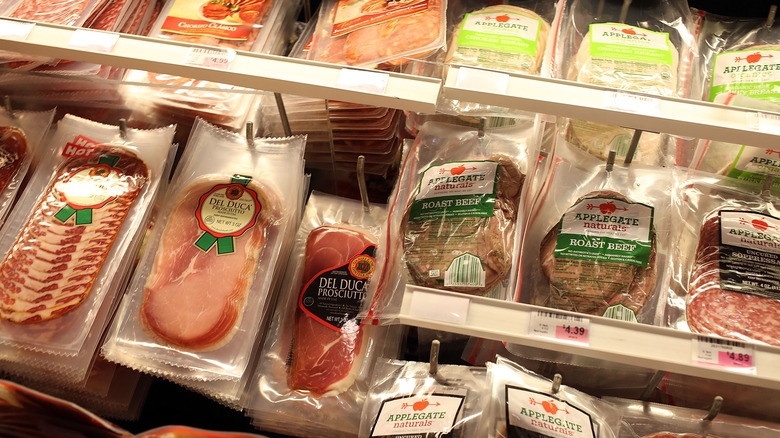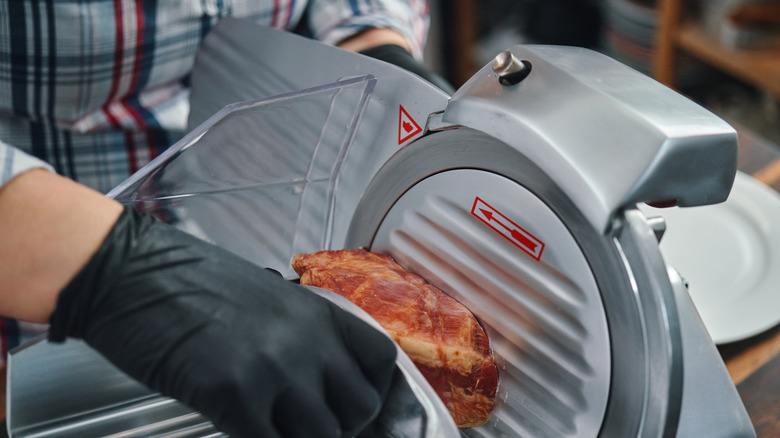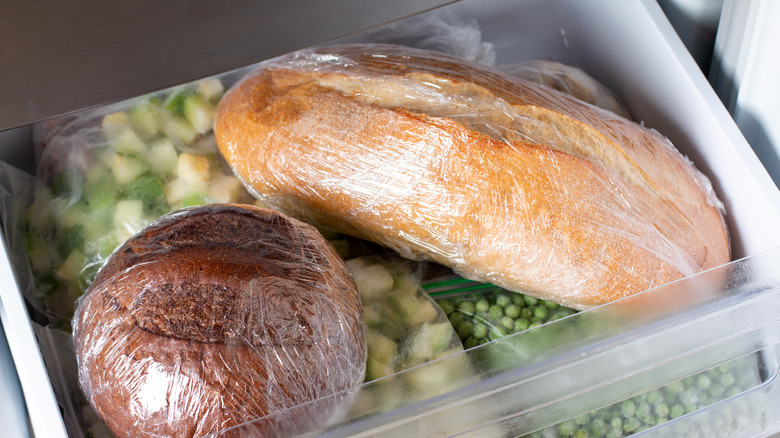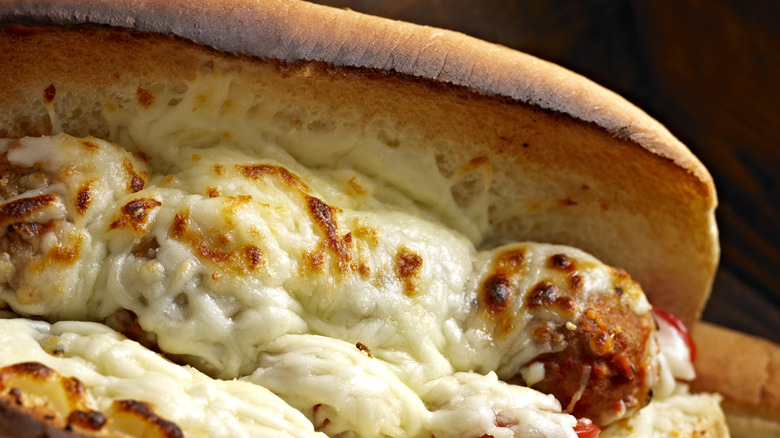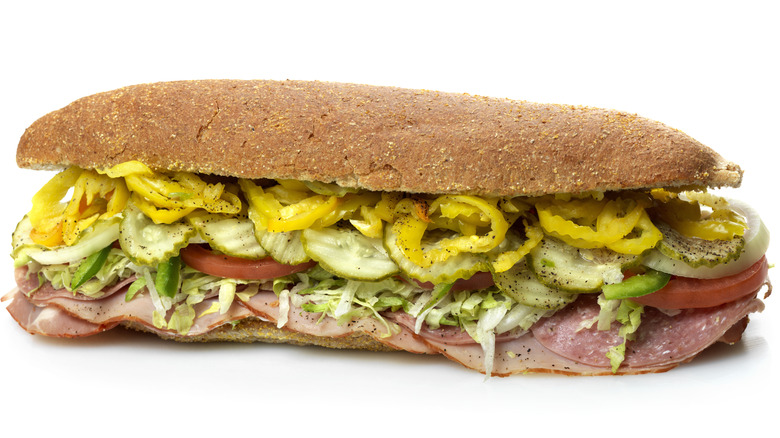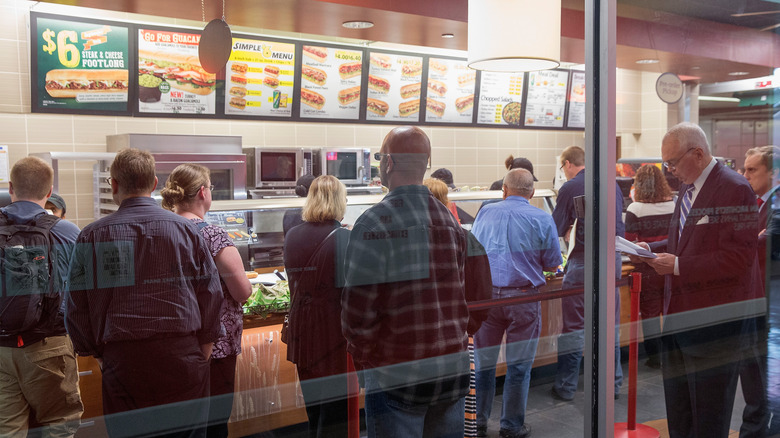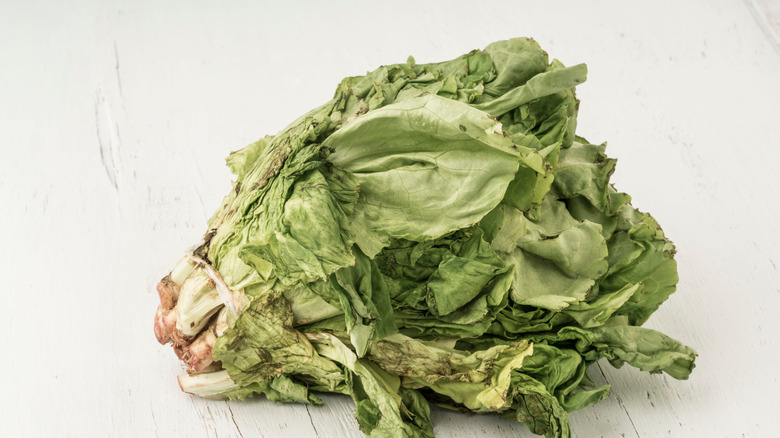The Biggest Sandwich Shop Red Flags
When you think of the most popular foods in the United States, the humble sandwich has to crack at least the top five. Sandwiches have the perfect combination of representing U.S. excess as well as exemplifying the multi-cultural melting pot that this country is built on. While the history of the sandwich is rooted in Europe, that doesn't take away from it now being the epitome of an American staple. In the U.S., there is every type of sandwich shop imaginable. From classic Italian delis to Vietnamese banh mi food stalls and a seemingly unending amount of varying chain sandwich shop concepts, the options are vast.
The best sandwiches in the U.S. mostly come from family-owned shops because of the pride and care they take in their signature item. When expanding beyond that, there are certain aspects to watch out for in any random sandwich shop that indicate it may not be where you want to spend your lunch money. We have taken it upon ourselves to delve into what may constitute a red flag upon observation so that you can make the most of your unrelenting sandwich cravings.
Cold cut meats and cheeses aren't freshly sliced
If you have been to many of the big sandwich chains, then you are accustomed to your sandwich meat and cheese not being sliced when you order. This has been so often critiqued that some chains have even begun adding meat slicers to their stores after years of pre-packaged products. Singular delis that take the time to slice meat and cheese, do so on the spot because it simply tastes better.
Cold cuts sliced fresh are also a healthier deli meat option. There is a smaller chance of these meats and cheeses containing harmful preservatives that would be best not to ingest. A top-tier deli not only cares about its customers' taste buds but also their digestive health. It wants you to return for sandwiches that satisfy cravings and give you more energy after lunch. If a sandwich spot doesn't take the time to serve the main components in the freshest and most ideal way possible, you may want to consider spending your money elsewhere.
The slicer isn't clean
There may be nothing grosser than seeing someone slice your meat and cheese on equipment that has not been properly cleaned. The surprising truth is deli slicers are not all that easy to clean, however, not making it a part of the everyday routine in a sandwich shop shows a lack of care for customers' health. Listeria bacteria is a common problem on deli meats cut with a dirty slicer. Deli employees and managers claim that far too many shops do not follow U.S. food code standards for sanitation, which could cause illnesses like E. Coli and Salmonella.
Much of the problem can also come from training. When employees don't have the proper guidance on how to clean a meat slicer, this can result in issues like rust on the machines. When you crave a sandwich it's natural to want your meat and cheese to have clean individual flavors that work together in harmony. If you taste lingering flavors from other cuts, it can ruin the balance you're hoping for.
There isn't freshly baked bread
Making fresh bread — or at least getting it from a local bakery — should be an absolute requirement if owners want anyone to take their sandwich shop seriously. This demand for quality also calls for using proper ingredients in the dough, without preservatives that make it last longer so it can be stored away.
The worst bread you can receive at a sandwich shop is stale and anything but fresh. When the bread isn't baked on-site daily, the likelihood that it's served stale is higher, just out of sheer time difference. Freshly baked bread also infuses a smell into an establishment. Any sandwich shop business should want to draw customers into the store who haven't been there before, and the wafting aroma of bread baking is one of the best ways to do so. If a deli doesn't freshly bake bread, or procure its bread from a local bakery, it's hard to believe that the shop owners put much thought into what is arguably the most important element of a sandwich.
Bread is suggested toasted or toasted without asking
Many chain restaurants have made it commonplace to offer sandwiches on toasted bread, but this practice can be deceiving. Good bread should not need to be toasted to be tasty. In fact, getting your sub bread toasted can trick you into thinking subpar bread is better than it is. However, to combat this practice, there Jersey Mike's goes against this trend and will refuse to toast your bread — even if you ask for it.
Don't expect toasted bread at an old school deli either. If you go into an Italian deli asking for toasted bread for your cold-cut sandwich, the employees will more than likely stare at you in disgust. If you go into an Italian deli and someone actually does toast your bread without asking first, then you may be having a sacrilegious experience. It's probably time to switch to a shop with higher standards.
Sandwich makers aren't washing their hands
The best practices for deli cleanliness and safety include hand washing. This has been a standard in delis across the country for years and any management at a store that doesn't require this is well behind the times — and FDA standards — we live in. There is a concerted effort to get rid of listeria in grocery store delis and sandwich shops, and limiting cross-contamination can help this cause. If sandwich makers aren't visibly washing their hands while you're in the shop, this should be taken as a red flag to seek out a different meal alternative.
Employees nationwide have been called out for failing to wash their hands, yet it still tends to happen. Making it a common practice is the responsibility of owners and managers. We can all understand how an employee gets caught up in an array of orders and forgets to continue this practice during a rush. However, a simple reminder from managers can make all the guests feel more at ease. It's safe to say we would rather wait a few more minutes for our sub knowing that it has been put together by someone with good hygiene practices.
No one is wearing plastic gloves, or they aren't switching them out between sandwiches
Although wearing gloves is not required by law, many states still recommend using them for ready-to-eat foods. This, of course, includes sandwiches. Just wearing gloves does not replace hand washing by any means, and wearing the same set of gloves all day is not hygienic either. The purpose of wearing and changing gloves is to avoid transferring germs from employees, as well as to prevent cross-contamination between ingredients like meat, cheeses, and veggies.
Many customers have questions about glove-wearing protocols. These vary from one sandwich shop to the next. Some delis might not have strict glove-switching policies because the price of gloves is so high. The problem when servers don't regularly change their gloves is if they happen to touch uncooked meat (very plausible in a deli with an extensive menu) and then make your sandwich immediately after. This could be a real health risk. Placing value on the importance of switching gloves is a matter of caring for diners.
They serve a fried fish sandwich
Chefs and sandwich makers alike tend to believe that customers should skip the fried fish sandwich on deli menus. This could indicate that a deli is actually willing to serve fish that might not be fresh enough to prepare for a grilled sandwich. If a sandwich shop is willing to use subpar ingredients, why would you trust it?
If a restaurant wants to hide fish that is less than fresh, covering it in batter or breadcrumbs tends to make it easier to mask the unpleasant texture. There is a sliminess that can develop when fish has been out too long as well as a smell, but the pungency of fryer oil may be just enough to make you believe it's good to eat. A fried fish sandwich also seems like an odd choice for a sandwich shop and is more common to see in fast food. Unless your sandwich shop makes a point of advertising a fresh catch used in its fried fish sandwiches, skip this altogether.
There's a bad smell upon entering
One way to know that meat or other items have gone bad is if you walk into a sandwich shop and something smells sour or just plain funky like spoiled milk. If this stench wafts into your nostrils upon entering the deli, it is best to leave at once without ordering a thing. Improperly packaging or storing meat, cheese, or veggies can lead to mold or other bacteria, which cause the products to decay. Do not eat at a sandwich shop that allows this to happen.
Another odd smell in a deli that can be a sign of bad practices is bad yeast which can smell like acetone or nail polish. While freshly baked bread can be one of the best smells in the world, if the yeast is cut with other chemicals or preservatives to make the bread last longer this can lead to a strange odor upon baking. If you have ever walked into a chain sandwich shop and wondered why it stinks, this could very well be the reason.
There's no signature sandwich
Any sandwich shop owner that wants to get their arms around their business and make people take interest may want to consider developing a signature sandwich. Having a sandwich so enticing and distinct that people will seek out a restaurant for it is a surefire way to garner success. Shops, however, that don't have a signature sandwich, or even a few that really attract specific attention, can often be an indication that a place just doesn't care enough to stand out. Thus, the sandwich shop may not be putting quite enough care into your taste buds.
Most sandwich shop owners take pride in their best sellers. What makes a good sandwich shop can often come down to those little details that elevate a normal sandwich to a one-of-a-kind meal. If a deli doesn't have one of these on its menu and the person at the counter says, "everything on our menu is our specialty," that could very much be a sign of something less than satisfactory.
They don't pay attention to customers or feedback
At the end of the day, customers are the ones who pay for food and keep sandwich shops afloat. As an owner, it's impossible listen to every piece of feedback from guests. However, if there is a consistent pattern in complaints, owners would be fools not to listen. Certain shops may even have an online reputation for dismissing wrongdoing and not doing nearly enough to change business practices for the better. Unfortunately, this can often lead to closures.
The best tip one could give for running a sandwich shop would be to actually study guests' likes and dislikes. When owners and managers take an interest in whether diners like their meals, it can lead to an overall improvement in quality as well as customer satisfaction. When we go out for a sandwich we want to feel the person who made it cared. We also want to know that a business can change if it isn't meeting our standards.
The veggies are soggy
There may be nothing in the world more off-putting than soggy lettuce on an otherwise beautifully constructed sandwich. If your sandwich maker at the deli picks up a lettuce leaf and you visibly see water dripping off of it, it may be time to cancel the order. There is a pretty easy way to avoid a soggy sandwich by making sure the wet and dry ingredients are stored separately at different temperatures. That said, not all shops follow this practice.
Another common soggy sandwich mistake sandwich shops make is not taking proper care of the tomatoes. Not only do they need to be stored at a steady cool temperature, but leaving them out and sliced for too long can induce sogginess quicker than shops may realize. Tomatoes are already generally pretty wet, but when they go from crispy and wet to soggy and slimy, they become basically inedible.
They put lettuce on a hot sandwich
Putting cold lettuce on a hot sandwich defeats the purpose of the leafy green. Not only is this a poor order choice at a deli, but if the shop actually lists lettuce as an ingredient on something like a chicken parmesan sub, run away fast! When you as a customer decide you want lettuce on your sandwich you want something crisp and refreshing to balance out the hefty and salty protein, dairy, and carbs.
Professional chefs detest the idea of lettuce on hot sandwiches because it forms a wilted mess on an otherwise great lunch item. When lettuce is placed on something like meatballs, cutlets, or breaded eggplant, it can throw off the entire dish and eliminate its culinary value. This red flag can be officially designated as a cardinal sin of the sandwich shop. From here forth, no deli worth its name in salt should ever resort to allowing romaine or iceberg on anything at a warm temperature.
They serve breakfast sandwiches with questionable fast food eggs
The truth about breakfast sandwiches at chain sandwich shops is that they tend to be a bit of an afterthought. Particularly if the eggs are prepackaged because rarely do chain sandwich shops actually have any sort of flat-top grill. Any chain sandwich shop that serves breakfast sandwiches, to begin with, is only looking to expand the times when customers will come in and buy food. Obviously, any business is concerned with turning a profit, but when it comes to sandwich chains and breakfast, quality often takes a backseat.
Fast food establishments are also known for less than excellent eggs quality. However, when one goes to a fast food restaurant for a breakfast sandwich they expect a certain level of greasy as it is most likely a purchase to quell something like a hangover. At a sandwich shop, customers should reasonably hope for a bit more freshness with their egg sandwiches. So why not leave them to the Burger Kings of the world? Some sandwich chains, such as Panera, have simply done away with real eggs on breakfast orders. Before you order, do your research because a lackluster breakfast sandwich is no way to start the day.
Condiments aren't refrigerated
Some deli condiments absolutely need to be refrigerated. These sauces, oils, and dressings are likely used in some shape or form on most sandwich shop menus that have a variety of different options. If there is any type of dairy in a condiment it must be refrigerated immediately after breaking the seal of its packaging. Once the temperature of the product gets too high from sitting out too long it will begin to sour and develop bacteria, making it dangerous to consume.
When thinking about how to store different condiments at a deli a different process is recommended for different sauces. For example, if you as a customer see any type of oil out and not refrigerated don't panic. Oils are better stored in a room-temperature environment. But if you witness mayonnaise or ranch dressing in an open-top squeeze bottle not being refrigerated or sitting in cold water that could be a huge red flag that a deli doesn't pay enough attention.
